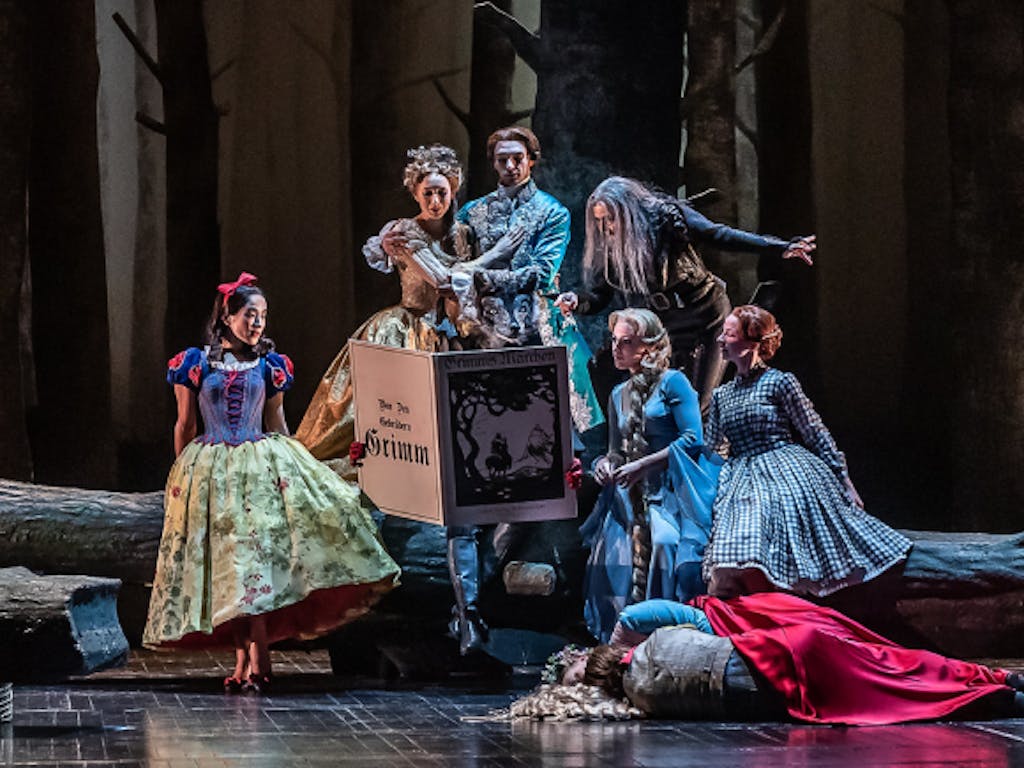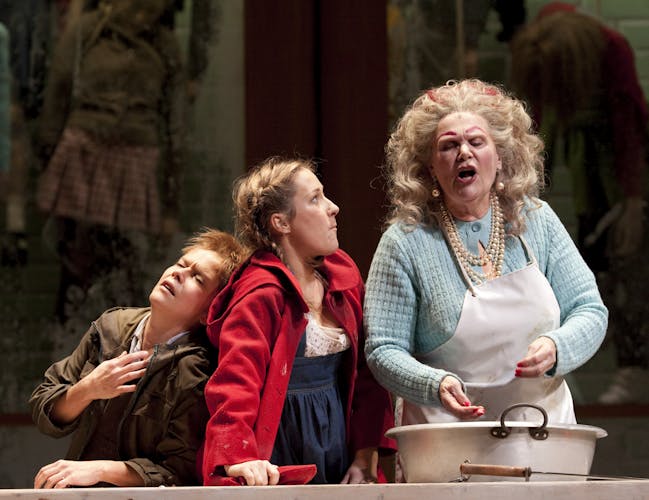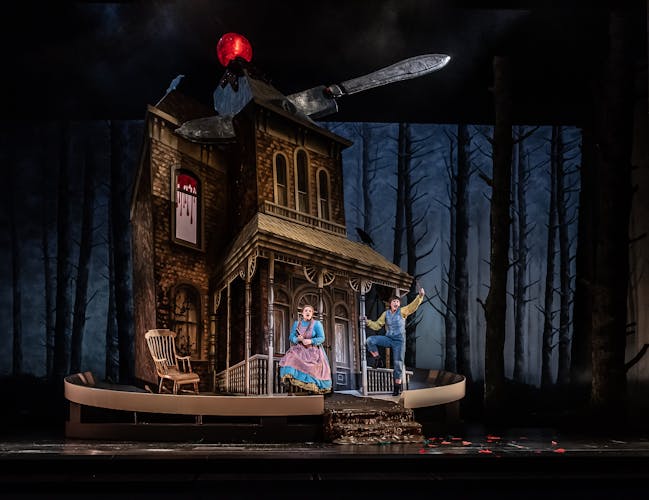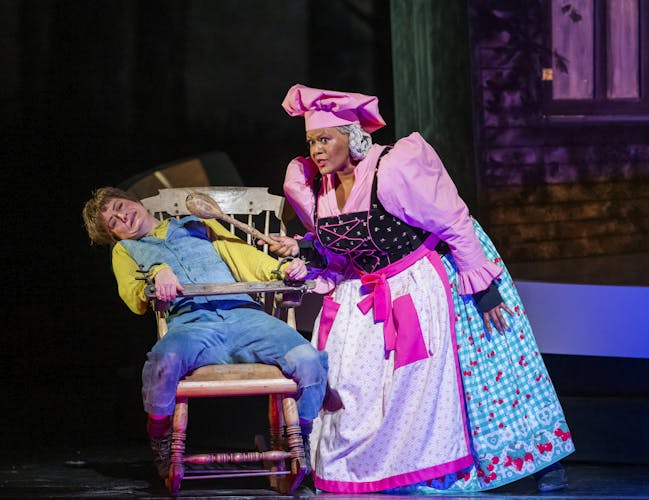Hansel and Gretel
Our quick guide to this fun and family-friendly production of this fairytale classic.
Engelbert Humperdinck's Hansel and Gretel is a delicious treat for all the family this Christmas and beyond.
Quick Facts
Who wrote the opera Hansel and Gretel?
Englebert Humperdinck wrote the music for Hansel and Gretel. The libretto was written in German by his sister, Adelheid Wette. The Royal Opera currently perform a production directed by Anthony McDonald and translated into English by Kelley Rourke.
What kind of opera is Hansel and Gretel?
Hansel and Gretel is a Märchenoper or fairy tale opera. It is based on the classic childrens' fairy tale written by the Grimm brothers, but with a more family-friendly plot. Rather than being abandoned in the forest by their parents, brother and sister Hansel and Gretel are sent into the woods to fetch strawberries for dinner. While on their adventure, they meet fairy tale characters and find a house made from chocolate. But then, they meet a witch who has an appetite for children!
How long is Hansel and Gretel?
The performance lasts approximately 2 hours 15 minutes, including one interval.
History
A family affair
The opera of Hansel and Gretel came from small, humble beginnings; Humperdinck's sister and her children wanted to perform a play to celebrate her husband's birthday. She asked her brother to 'help and help quickly' to provide the music for four songs that the children could sing for their father. Two of these original ditties were later incorporated into the opera. The Tanzlied, or dance song, 'Brüderchen komm tanz mit mir' (Brother, come dance with me) is heard in Act I and parts of the 'Cock-a-doodle-do' song can be found in Act III.
Soon after the birthday performance, Adelheid and Englebert began discussing expanding the work into a Singspeil version of Hansel and Gretel, with songs interspersed with dialogue. The Humperdinck siblings were encouraged in this by none other than Cosima Wagner, daughter of Franz Liszt and wife of Richard Wagner. Encouraged by friends including Richard Strauss, Humperdinck continued to expand the original family songs, now creating a full Märchenoper or fairy tale opera. It was first performed on 23 December 1893 and in the 131 years since, Hansel and Gretel has become a festive tradition. It was the first full opera to be broadcast on television, appearing on a local TV channel in New York on the 23 December 1943.
Hansel and Gretel Synopsis
Characters
- Hansel – A young boy (sung by a mezzo-soprano)
- Gretel – A young girl (sung by a soprano)
- Gertrud – Their mother (sung by a mezzo-soprano)
- Peter – Their father (sung by a bass-baritone)
- Witch – A witch that lives in the forest (sung by a soprano)
Hansel and Gretel are meant to be working, but are bored and hungry. Gretel tells Hansel that their mother has been given a jug of milk and will make a rice pudding for supper. Hansel tries to steal the cream and Gretel scolds him. Brother and sister decide to stop work, and have some fun. Their mother Gertrud returns home to find them dancing, and is angry. She accidentally knocks over the jug of milk. Now there is no supper, so Gertrud sends the children out into the forest to find strawberries. Gertrud is exhausted and depressed, and worried about her family’s poverty.
The children’s father Peter returns, cheerful after a successful day’s work selling brooms. Gertrud at first suspects he is drunk, but is overjoyed when she sees the vast quantities of food he has purchased. Peter wonders where the children are, and Gertrud explains that she has sent Hansel and Gretel out into the forest. Peter is worried, and tells Gertrud about the terrifying witch who lives there, who lures children into her home to eat them. The parents hurry off to find their children.
Gretel makes a garland of flowers while Hansel gathers strawberries. Hansel crowns Gretel queen of the forest. The children hear a cuckoo and mimic it. They pretend to be cuckoos themselves, and feed each other strawberries until they are all gone. Gretel worries that their mother will be angry with them. She tries to look for more berries, but it is too dark.
Hansel and Gretel realize they are lost. The sound of their voices echoing scares them. The tiny Sandman arrives, and soothes the children with a song. Hansel and Gretel become sleepy. They say their evening prayers and fall asleep. Fairy-tale creatures from the forest come to watch over them.
The Dew Fairy arrives to wake up the children. Hansel and Gretel tell each other about their mysterious and marvellous dreams. They now feel ready for anything.
Suddenly the children see a house appear as if by magic. It is partly edible, and they can’t resist it. As Hansel and Gretel nibble at the house, they hear a voice, and the Witch emerges. She tells the children that her name is Rosina Leckermaul and invites them in.
When Hansel and Gretel try to run away, the Witch stops them with a spell. She traps Hansel, orders Gretel to lay the table and eagerly anticipates her forthcoming meal.
The Witch decides that Hansel isn’t fat enough to eat yet and must be fed. While she does this, Gretel steals her magic wand to free Hansel. The Witch asks Gretel to check how her baking is doing. Gretel pretends that she doesn’t know what to do. When the Witch demonstrates, Hansel and Gretel push her into the huge bowl of chocolate mixture.
Children who the Witch trapped and blinded appear. Hansel and Gretel restore their sight by touching them, and Hansel frees them using the Witch’s wand. Hansel and Gretel’s parents arrive to find their children safe and happy. The family are overjoyed to be together again, and everyone celebrates.
Pictures and Videos
Gallery
Sweet melodies and brooding tunes
The music of Hansel and Gretel is patchwork of styles that paint a picture of the story, characters and scenery within the opera. For an work that was originally written for children, it is no surprise that the melodies for Hansel and Gretel are playful, simple and memorable. In the opening scene of Act I, the musical games are reminiscent of the playfulness between brother and sister.
As the children enter the forest in Act II, a world of complexity is demonstrated through more symphonic musical writing. It is suggested that Humperdinck was heavily influenced by his friend Richard Wagner and that some of the motifs found in the orchestral passages are reminiscent of Wagner's Ring cycle.
A shared name – with an operatic connection
In the late 1960s, at the suggestion of his agent, a little-known British singer called Arnold George Dorsey changed his name. Becoming Engelbert Humperdinck, it turned out, would prove to be a key moment in the singer’s career: the Hansel and Gretel composer’s name was much more memorable, and chart success followed. Yet the choice of name wasn’t entirely random: Dorsey’s mother was an opera singer, and Humperdinck reminisced that she could make chandeliers shake with her voice.
Watch more
Watch a performance
Hansel and Gretel runs from 22 December 2024 – 9 January 2025. There are many other ways to watch.
- Main Stage
Hansel and Gretel
- Opera and Music
A delicious treat for all the family returns this Christmas.

Watch on Royal Ballet and Opera Stream
You can watch the production as well as behind-the-scenes insights, interviews and introductions on Royal Ballet and Opera Stream.
Royal Opera House Covent Garden Foundation, a charitable company limited by guarantee incorporated in England and Wales (Company number 480523) Charity Registered (Number 211775)



